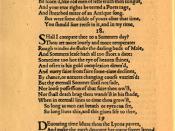The two poems I will be comparing and contrasting in this essay are two of William Shakespeare's most famous sonnets. Sonnets numbered 18, 'Shall I compare thee...' and 116, 'Let me not.' Both of these poems deal with the subject of love but each poem deals with its subject matter in a slightly different manner. Each also has a different audience and purpose. In the case of 'Shall I compare thee...' the audience is meant to be the person Shakespeare is writing the sonnet about. Its purpose is to tell the person it's written about how the speaker feels about them. In the case of 'Let me not' the audience is anyone who wishes to read it. Its purpose is to introduce what love should be like. This makes 'Shall I compare thee...' much more personal and realistic as a poem about love.
'Shall I compare thee...' seems to deal more with the idea of a lover rather than the idea of a relationship, as 'Let me not' does. 'Shall I compare thee...' deals with the idea of a perfect lover and the fading beauty of both women and the seasons. 'Let me not' is about ideal love in its most perfect and purest form.
In 'Shall I compare thee...' Shakespeare describes a lover 'more temperate' than a summer's day. Shakespeare asserts the opinion that the beauty of summer is nothing compared to this perfect human being. In the poem Shakespeare deals with the fading beauty of this perfect human being and lover. Shakespeare expresses the sentiment that even though outer beauty fades inner beauty ('eternal summer') will not fade. The perfect lover's beauty will not fade because she has been immortalised in a sonnet. 'So long live...


